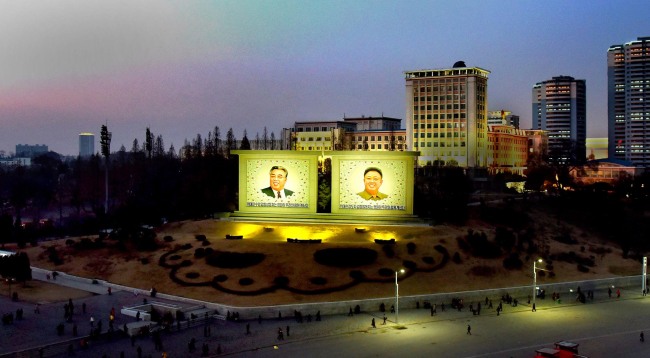South Koreans on average outlive North Koreans by some 12 years, partly because North Korea’s high infant mortality rate is about seven times higher than the South’s, according to South Korean government data.
Data released by Statistics Korea placed this year’s life expectancy rate for South Koreans at 78.2 years for men and 85 years for women. In comparison, the rate for North Korean men was 66 years and 72.7 years for women.
The infant mortality rate, one of the biggest reasons behind the life expectancy disparity, was measured at 22.0 deaths of infants under age 1 per 1,000 live births in North Korea, a figure 7.6 times higher than in the South.
 |
| A night in Pyongyang. Yonhap |
According to the latest reports by the Korea Foundation for International Healthcare, the only South Korean agency that provides health care support to North Korea, some of the most vulnerable social groups in the communist state’s poor medical system were pregnant women.
As of 2010, North Korea’s maternal mortality ratio was 81 women per 100,000 live births. South Korea’s ratio was 16, while Japan and China’s ratios were 5 and 37, respectively.
According to KOFIH’s 2013 data, less than 10 percent of North Korean obstetricians and gynecologists have been trained in newborn care. Family doctors in small regional clinics are not trained in emergency obstetric and newborn care, childbirth or gynecology.
Poor sterilization of medical equipment also leads to infection of patients in North Korean medical facilities, data showed. In the country, 15 percent of women who died due to complications from pregnancy or childbirth died from sepsis, a whole-body inflammation caused by an infection.
Statistics Korea predicted that by 2055, the life expectancy rate would reach 85.9 years for South Korean men and 89.8 years for women, while the rate for North Korean men would reach 71.4 years for men and 77.9 years for women.
Poor nutrition and an inadequate number of health care professionals have been also noted as some of the reasons behind North Korea’s lower life expectancy rate. In 2001, North Korea had just 31.6 doctors per 10,000 civilians. As of 2013, North Koreans on average consume 2,094 calories, which is significantly lower than the world average of 2,870 calories and 3,056 calories in the South.
By Claire Lee (dyc@heraldcorp.com)

